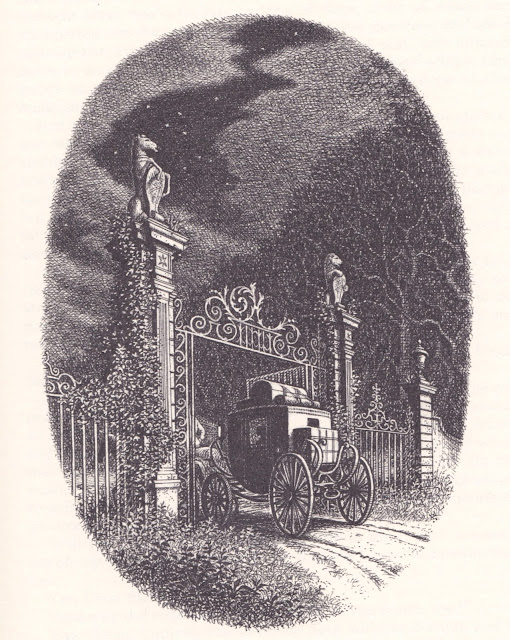"Will you tell - yes or no - is my cousin in the coach?" screamed the plump young lady, stamping her stout black boot, in a momentary lull.Yes, I was there, sure."And why the puck don't you let her out, you stupe, you?""Run down, Giblets, you never do nout without driving, and let Cousin Maud out. You are very welcome to Bartram."
I was slogging my way through a disappointingly tedious read of Sheridan Le Fanu's Uncle Silas: A Tale of Bartram-Haugh when I was gobsmacked to encounter this sentence. A Google search of "why the puck" was contaminated by references to the physics of ice hockey, and after subtracting -hockey I could find no relevant information.
The novel is from the Victorian era, so I turned my attention to the OED. "Puck/pook/pooka etc" as a noun typically refers to an evil malicious spirit, goblin, mischievous child, or the ice-hockey and bandy "ball" - none of which seems relevant to the usage here. And I can't see it being related to "pukka" (genuine) as in "pukka sahib." So I'm left without an explanation, unless this is a Bowlderisation of "why the fuck," since the f-word dates back centuries before the Victorians, and would be used here as an intensifier (or "vexation interrogative") for the question. I would be delighted to see any informed commentary from readers.
I was disappointed not to find any descriptions in the book of the phenomenon of sleep paralysis since Le Fanu was said to be haunted by persistent dreams of a crumbling old mansion that was threatening to fall and crush him ("This unrelenting nightmare had become painful, and he often struggled and screamed in his sleep.") He died with an expression of horror on his face and his personal doctor said "I feared this - that house fell at last."
I only skimmed the book, so I found only two other interesting word usages. "Sometimes, when the curate calls, he has me up - for he's as religious as six, he is..." presumably means as religious as six normal people (?). And "... we got at last into a picturesque dingle: the grey rocks peeped from among the ferns and wildflowers..." ("a deep dell or hollow, esp closely wooded").

Now I'm curious about the origin of "single berry."
ReplyDeleteI can see where it would be similar to "then why the devil....", since Puck was a mischievous fairy/spirit.
ReplyDeleteabout the devilish puck (excerpt below).
ReplyDeleteI-)
https://stronglang.wordpress.com/2016/03/21/what-the-digamma/ What the digamma?
Pushing back further, we have the close-but-no-cigar what the puck in Joseph Wright’s 1903 English Dialect Dictionary (“What the puck are you doing?”). That uses the Irish English intensifier the puck, which is attested as early as 1864 in J. Sheridan Le Fanu’s novel Uncle Silas (“And why the puck don’t you let her out?”). But since puck means “an evil spirit or demon,” what the puck could simply be understood as an Irish variant of what the devil.
"As religious as six" might reference the traditional monk's schedule of praying Vigils at 6:00am.
ReplyDeleteThe OED look like to much trouble to get into. Dictionary.com had the following...
ReplyDeletehttps://www.dictionary.com/browse/puck -
noun
Also called Hobgoblin, Robin Goodfellow. a particularly mischievous sprite in English folklore who appears as a character in Shakespeare's A Midsummer Night's Dream.
(lowercase) a malicious or mischievous demon or spirit; a goblin.
ORIGIN OF PUCK
before 1000; Middle English pouke, Old English pūca; cognate with Old Norse pūki a mischievous demon
https://en.wikipedia.org/wiki/Puck
https://en.wikipedia.org/wiki/Puck_(folklore)
There are several instances of "what the puck" in Google's search of books in the 19th century. Interesting!
ReplyDeletehttps://www.google.com/search?q=%22what+the+puck%22&lr=lang_en&tbs=lr:lang_1en,cdr:1,cd_min:1800,cd_max:1899&tbm=bks&sxsrf=ALeKk01EXMooemhCR8BEGNKYXi3hYp-mZw:1618947626458&source=lnt&sa=X&ved=0ahUKEwjD47zxyY3wAhWMQs0KHQQSCGMQpwUIJw&biw=1131&bih=778&dpr=2.5
Found this, looking for "why the puck...." I've known the digamma for years, but never knew this use of it:
ReplyDeletehttps://slate.com/human-interest/2016/03/the-use-of-digamma-as-an-ancient-replacement-for-the-f-word.html
Might "religious as six" be a cricket reference? Six is the highest possible score obtainable with a single stroke of the bat, and "knocking for six" was certainly a common cant expression.
ReplyDeleteExcellent. That hadn't occurred to me, but it does make sense. :-)
Delete